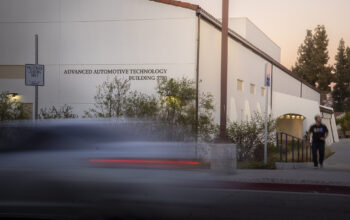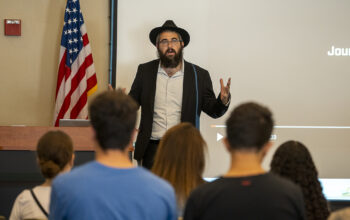With another step forward toward the end of the pandemic, the Academic Senate at Pierce College returned to campus Monday, marking their first meeting in person since Covid restrictions shut down schools.
The meeting was held live in the 600 Building as well as on Zoom to discuss curriculum policy updates and other items on the agenda.
During the meeting, the Senate was presented with a temporary amendment from the Curriculum Committee on the issue of overdue Course Outline or Record (CORs) that departments have yet to submit.
Curriculum Committee Chair Margarita Pillado shared, “All department chairs and deans have been notified that as part of legal requirements and accreditation requirements, the CORs must be regularly updated.”
Pillado added that Career Technical Education (CTE) courses, in particular, must be updated every two years, so these are the most critical to be dealt with.
The temporary amendment calls for certain departments to manage their overdue workloads so that at least one-third of the overdue CORs are initiated and finalized by the end of the spring semester, with the remaining to be revised by the end of the Spring 2024 semester.
“As long as the departments communicate the plan to the Curriculum Committee by the April 21st meeting, then everything is okay,” Pillado said. “We need to send a message as soon as possible to those departments.”
If departments do not have a plan to update their CORs, the administration will step in and decide what to do with the courses.
Pillado stressed that departments should follow up on notifications from the Curriculum Department with their COR revision updates.
The temporary amendment was supported by the Senate body.
Interim President Ara Aguiar provided an update on the college administrative report and answered questions.
Aguiar also discussed updates on the campus pools, which were shut down in October due to damages.
Aguiar didn’t have an exact answer on when the pools would be fixed, but she was able to give some more information as to where the repairs stand.
“They’ve completed one level of assessment,” Aguiar said. “They’ve established that there are some chemical title agents that are negatively impacting all of the infrastructure.”
The pools are expected to go through more levels of assessment to find out how much damage there is and to determine the costs of repairs.
Academic Senate Treasurer Alex Villalta proposed a budget that is almost $3,000 higher than the 2021-2022 school year budget.
“You can see the differences this year from last year due to price changing and inflation,” Villaita said.
He also added that a yearly $3,000 check from the ESA is still available and must be spent before the Mar 30 deadline.
Villalta and others proposed that in the future, the Senate will have to consider increasing academic dues and make hard choices on expenditures. Currently, there isn’t much participation in paying academic dues.
Articulation Officer Cristina Rodriguez announced that the school will receive word on decisions made regarding the courses that were submitted for General Education (GE) review in May.
The new California General Education Transfer Curriculum (CalGETC) requirements are also set to be revealed then.
“A memo from the Academic Senate for California Community Colleges was released indicating that the CalGETC will be the only general education pathway for the Associate Degree for Transfer,” Rodriguez said.
She also mentioned that the California State University (CSU) system, however, has no plan to discontinue the CSU GE breadth pattern.
More information on transfer degree requirements will come in May.
Associated Student Organization President Qais Azizi provided a reminder about ASO meeting times, which are Tuesdays at 1 p.m. in the ASO conference room.
ASO will be holding elections for the fall semester. The election will include senator, officer and student representative positions. In addition to attending the ASO meetings, the elected students will also be expected to attend the academic senate meetings.
“If you happen to know any students, or maybe if you want to spread the word, that’d be great for whoever wants to get involved in student government,” Azizi said.
Azizi encourages students who want to participate in student government and committees to join.
The next Academic Senate meeting is set to take place March 27 at 2:15 p.m. in building 600 and also on Zoom for those who cannot attend in person.




